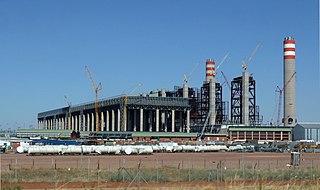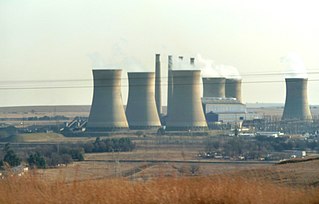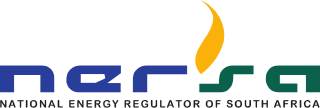Eskom Hld SOC Ltd or Eskom (Afrikaans: Elektrisiteitsvoorsieningskommissie) is a South African electricity public utility. Eskom was established in 1923 as the Electricity Supply Commission (ESCOM). Eskom represents South Africa in the Southern African Power Pool. The utility is the largest producer of electricity in Africa, and was among the top utilities in the world in terms of generation capacity and sales. It is the largest of South Africa's state owned enterprises. Eskom operates a number of notable power stations, including Matimba Power Station and Medupi Power Station in Lephalale, Kusile Power Station in Witbank, Kendal Power Station, and Koeberg Nuclear Power Station in the Western Cape Province, the only nuclear power plant in Africa.

Earthlife Africa is a South African environmental and anti-nuclear organisation founded in August 1988, in Johannesburg. Initially conceived of as a South African version of Greenpeace, the group began by playing a radical, anti-apartheid, activist role. ELA is arguably now more of a reformist lobby or pressure group. Considered by some to be a key voice in the emerging environmental justice movement, Earthlife Africa has been criticised for being too radical, and by others for "working with traditional conservation movements" in furthering the environmental struggle.

Medupi Power Station is a dry-cooled coal-fired power station built by Eskom near Lephalale in Limpopo province, South Africa. The station consists of 6 generating units with a nameplate capacity of 800 MW each bringing the total installed capacity of 4,800 MW.

Camden Power Station in Mpumalanga, South Africa, is a coal-fired power plant operated by Eskom.
Majuba Power Station between Volksrust and Amersfoort in Mpumalanga, South Africa, is a coal-fired power plant operated by Eskom. Majuba is Eskom's only power station that is not linked to a specific mine and it receives its coal from various sources. This was due to an error in geotechnical engineering core drilling which did not identify that the proposed local coal mine was under solid bedrock.
Tutuka Power Station in Mpumalanga, South Africa, is a coal-fired power plant operated by Eskom. It is a twin sister to Duvha Power Station.
South Africa has a large energy sector, being the third-largest economy in Africa. The country consumed 227 TWh of electricity in 2018. The vast majority of South Africa's electricity was produced from coal, with the fuel responsible for 88% of production in 2017. South Africa is the 7th largest coal producer in the world. As of July 2018, South Africa had a coal power generation capacity of 39 gigawatts (GW). South Africa is the world's 14th largest emitter of greenhouse gases. South Africa is planning to shift away from coal in the electricity sector and the country produces the most solar and wind energy by terawatt-hours in Africa. The country aims to decommission 34 GW of coal-fired power capacity by 2050. It also aims to build at least 20 GW of renewable power generation capacity by 2030. South Africa aims to generate 77,834 megawatts (MW) of electricity by 2030, with new capacity coming significantly from renewable sources to meet emission reduction targets. Through its goals stated in the Integrated Resource Plan, it announced the Renewable Energy Independent Power Producer Procurement Programme, which aims to increase renewable power generation through private sector investment.

Solar power in South Africa includes photovoltaics (PV) as well as concentrated solar power (CSP). As of 2023, South Africa had over 2700 MW of installed PV solar power capacity in its grid, in addition to 500 MW of CSP. Installed capacity is expected to reach 8,400 MW by 2030.

Bokpoort CSP is a concentrated solar power (CSP) thermal energy power plant, located near Groblershoop in the Northern Cape province of South Africa. The project was procured pursuant to the Renewable Energy Independent Power Producer Procurement Programme (REIPPPP) initiated by the South African Department of Energy.
Redstone Solar Thermal Power (RSTP) is a solar power tower with molten salt energy storage, located in Postmasburg, near Kimberley, in the Northern Cape Region of South Africa. Redstone will have a capacity of 100 megawatts (MW) to deliver power to 200,000 people and was awarded in bid window 3.5 of the REIPPP at a strike price of 122.3 ZAR/KWh including time of day pricing in 2015. The project was initially based on the technology of now bankrupt Solar Reserve, but was delayed for several years because the PPA was not signed by Eskom until 2018. After the project was revived the plant is now under construction and the technology will be provided by Brightsource and John Cockerill, as demonstrated in the Noor Energy 1 project in the UAE.
De Aar Solar Power is located 6 km outside the town of De Aar in the Northern Cape Province of South Africa. The facility is based on over 100 hectares of Emathanjeni Municipal land, and comprises 167,580 solar (PV) panels. De Aar Solar Power supplies Eskom with 85,458 MWh of renewable electrical energy per year; enough to power more than 19 000 average South African households.

Renewable energy in South Africa is energy generated in South Africa from renewable resources, those that naturally replenish themselves—such as sunlight, wind, tides, waves, rain, biomass, and geothermal heat. Renewable energy focuses on four core areas: electricity generation, air and water heating/cooling, transportation, and rural energy services. The energy sector in South Africa is an important component of global energy regimes due to the country's innovation and advances in renewable energy. South Africa's greenhouse gas (GHG) emissions is ranked as moderate and its per capita emission rate is higher than the global average. Energy demand within the country is expected to rise steadily and double by 2025.
In South Africa the Department of Public Enterprises is the shareholder representative of the South African Government with oversight responsibility for state-owned enterprises in key sectors. Some companies are not directly controlled by the Department of Public Enterprises, but by various other departments. Further, not all state owned entities are registered as companies.

South Africa’s energy crisis or load shedding is an ongoing period of widespread national blackouts of electricity supply. It began in the later months of 2007 towards the end of Thabo Mbeki's second term as president, and continues to the present. The South African government-owned national power utility, and primary power generator, Eskom, and various parliamentarians attributed these rolling blackouts to insufficient generation capacity.

National Energy Regulator of South Africa (NERSA), is the regulatory authority for the electricity supply industry in South Africa.

The Renewable Energy Independent Power Producer Procurement Programme (REIPPPP) is an initiative by the South African government aimed at increasing electricity capacity through private sector investment in solar photovoltaic and concentrated solar, onshore wind power, small hydro, landfill gas, biomass, and biogas. As of 2023, a total of 123 projects have been awarded to the private sector. Private sector investment totalling R256 billion has been committed to the REIPPPP. Four of the six Bid Windows have come online, totalling 6200 MW of installed capacity.
The Integrated Resource Plan (IRP) is a plan aimed at estimating South Africa's electricity demand. It takes into account how the demand of electricity will be met and the expense of such a demand. The plan refers to electricity generation and expansion programmes.
The De Aar 1 Solar Power Station is an 85.26 MW solar power plant in South Africa. The solar farm is owned by South African independent power producer (IPP), Solar Capital (Pty) Limited, a subsidiary of the Phelan Energy Group, which is headquartered in Dubai, United Arab Emirates. The off-taker of the power generated here is Eskom Holdings, the national electricity parastatal company, under a 20-year power purchase agreement (PPA).

City PowerJohannesburg is a state owned power utility, wholly owned by the City of Johannesburg. Its responsibilities include buying electricity from power producers and supplying it to the public, and installing and maintaining the electrical infrastructure in the city of Johannesburg. It supplies electricity to 3.2 million people in the Greater Johannesburg Metropolitan Area.










